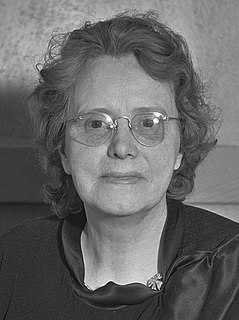A Quote by Swami Vivekananda
Man can think of divine things only in his own human way, to us the Absolute can be expressed only in our relative language.
Related Quotes
Everyone has an equal and absolute right to sovereignty over his own body, his own property, and his own life, and to pursue his own happiness in any way that he chooses. No one has the authority to grant rights to anyone else, because human beings already possess all natural rights at birth. These rights include both personal and economic freedoms, and the only way they can be lost is if someone takes them away by force. The only right that an individual does not naturally possess is the right to violate someone else's liberty.
Modern prophets say that our economics have failed us. No! It is not our economics which have failed; it is man who has failed-man who has forgotten God. Hence no manner of economic or political readjustment can possibly save our civilization; we can be saved only by a renovation of the inner man, only by a purging of our hearts and souls; for only by seeking first the Kingdom of God and His Justice will all these other things be added unto us.
Human intellectual progress, such as it has been, results from our long struggle to see things 'as they are,' or in the most universally comprehensible way, and not as projections of our own emotions. Thunder is not a tantrum in the sky, disease is not a divine punishment, and not every death or accident results from witchcraft. What we call the Enlightenment and hold on to only tenuously, by our fingernails, is the slow-dawning understanding that the world is unfolding according to its own inner algorithms of cause and effect, probability and chance, without any regard for human feelings.
It is only in the giving of ourselves to others that we truly live — only with the meeting of our minds — thine and mine — do we become conscious of the divine spark each of us shares — only in sharing in our daily contacts, one with another, in our mutual hopes and fears do we find real peace. The human contribution is the essential ingredient.
God shows us in Himself, strange as it may seem, not only authoritative perfection, but even the perfection of obedience--an obedience to His own laws; and in the cumbrous movement of those unwieldiest of his creatures we are reminded, even in His divine essence, of that attribute of uprightness in the human creature "that sweareth to his own hurt and changeth not.
With only one life to live we can't afford to live it only for itself. Somehow we must each for himself, find the way in which we can make our individual lives fit into the pattern of all the lives which surround it. We must establish our own relationships to the whole. And each must do it in his own way, using his own talents, relying on his own integrity and strength, climbing his own road to his own summit.
Its [the anthropological method] power to make us understand the roots from which our civilization has sprung, that it impresses us with the relative value of all forms of culture, and thus serves as a check to an exaggerated valuation of the standpoint of our own period, which we are only too liable to consider the ultimate goal of human evolution, thus depriving ourselves of the benefits to be gained from the teachings of other cultures and hindering an objective criticism of our own work.
...Those laws are within the grasp of the human mind. God wanted us to recognize them by creating us after his own image so that we could share in his own thoughts... and if piety allow us to say so, our understanding is in this respect of the same kind as the divine, at least as far as we are able to grasp something of it in our mortal life.
Mathematics never reveals man to the degree, never expresses him in the way, that any other field of human endeavour does: the extent of the negation of man's corporeal self that mathematics achieves cannot be compared with anything. Whoever is interested in this subject I refer to my articles. Here I will say only that the world injected its patterns into human language at the very inception of that language; mathematics sleeps in every utterance, and can only be discovered, never invented.
The question occurred to me: Well, if that's so, if the Divine is ultimately formless and genderless, what's the big deal? Why all this bother? The bother is because we have no other way of speaking about the Absolute. We need forms and images. Without them we have no way of relating to the Divine. Symbol and image create a universal spiritual language. It's the language the soul understands.
Every man who is not for us in this prolonged struggle for liberty is responsible for the present degradation of the mothers of the race. It is pitiful to see how few men ever have made our cause their own, but while leaving us to fight our battle alone, they have been unsparing in their criticism of every failure. Of all the battles for liberty in the long past, woman only has been left to fight her own, without help and with all the powers of earth and heaven, human and divine, arrayed against her.
Only a law-order which holds to the primacy of God's law can bring forth true freedom, freedom for justice, truth, and godly life. Freedom as an absolute is simply an assertion of man's "right" to be his own god; this means a radical denial of God's law-order. "Freedom" thus is another name for the claim by man to divinity and autonomy. It means that man becomes his own absolute.






































